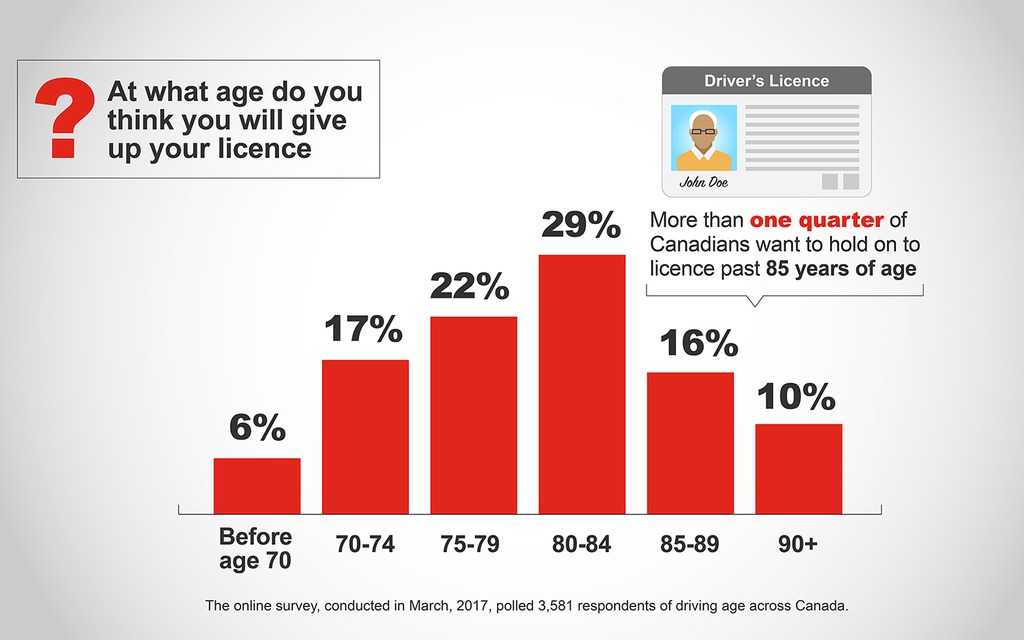More than one quarter of Canadians want to hold on to their driver's licence past 85 years of age
As Canadian boomers age, the number of elderly drivers on our roads increases. Statistics Canada's 2016 census reveals that those 65 years of age and over now outnumber those 14 years of age and under for the first time ever. But vital conversations about how to determine when a person is unfit to drive are difficult.
According to a recent national survey from State Farm Canada, one in ten respondents has been in a collision involving a senior citizen. And while 94 per cent of respondents believe that individuals should speak with senior family members about giving up their licence if they are concerned about their safety, only 2 per cent of seniors surveyed said that a family member has had that conversation with them.
Read also
In a 2011 report, Transport Canada stated that drivers aged 65 and over represent 17 per cent of fatalities though they only account for 14 per cent of licensed drivers1. And the rate of fatalities per distance travelled increases considerably at age 75. As seniors age, they are more likely to develop physical and cognitive infirmities.
"Canadians are conflicted when it comes to the balance between road safety and the autonomy associated with driving." says John Bordignon, Media Relations, State Farm Canada. "These are extremely difficult discussions for families to have. When a person is deemed unfit to drive, it can feel like a sudden loss of independence. To make the transition easier, it's important for family members to have supportive conversations early on and explore transportation alternatives over time, so that changes in lifestyle come gradually."
Tough Conversations
Just 33 per cent of respondents to State Farm Canada's survey say that they have had a conversation with a senior family member about giving up their licence due to concerns about safety, but when those conversations occur they don't always go well.
Of those respondents who say they have spoken with a senior family member about giving up their licence, nearly 80 per cent said that they faced resistance from the family member.
When asked what they believe to be the biggest factors keeping seniors from giving up their licence, 74 per cent said a loss of independence, 12 per cent said a lack of awareness about the warning signs of driving incapacity, 6 per cent said lack of public transportation, and 4 per cent said the cost of taxis.
A Driver's Age
According to research conducted by the Traffic Injury Research Foundation in 2016, drivers aged 65 and older are over-represented in crashes, particularly those aged 80 and older2. Partly because seniors are more susceptible to injury and less likely to survive a serious collision than younger drivers. Drivers 65 and over are also susceptible to age-related declines in reaction time and mobility, and can be affected by factors such as heart disease, visual impairment, dementia, and impairment due to prescription medication.
"When reviewing the evidence, it becomes clear that elderly drivers are overrepresented in fatal and severe crashes due to a variety of factors associated with advancing age", explains Ward Vanlaar. Chief Operating Officer of TIRF. "One solution is identifying health issues that affect driving ability and having conversations with family members about looking for alternatives. Ensuring a senior can continue to drive safely will have positive effects on their quality of life, but there comes a time when it might be safer to let someone else take the wheel."

Hanging up the Keys
The State Farm Canada survey indicates that Canadian seniors are reluctant to give up their keys with 26 per cent saying they want to hold onto their licence past 85 years of age.
So when the time finally comes, what are the factors that would lead someone to give up their licence? According to respondents 65 years of age and older, the three biggest factors affecting their decision are advice from a medical professional (94 per cent), concerned family members and friends (27 per cent), and a collision (14 per cent).
About the Survey
The online survey, conducted in March 2017, polled 3,581 respondents of driving age across Canada.








